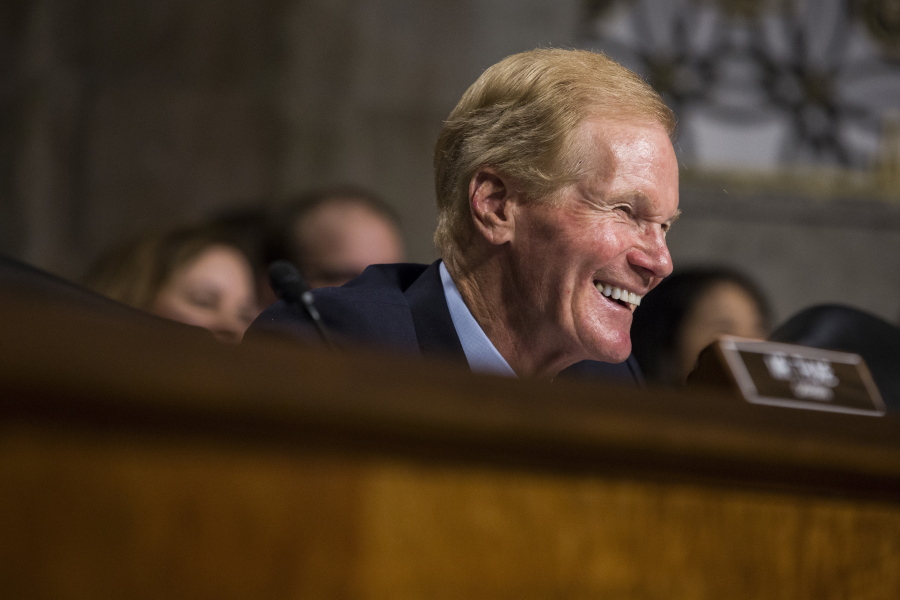Newcomers to Congress were still finding their seats this month when the opening barrage sounded in the battle over whether more than 30,000 workers should be cut from the federal payroll.
President Donald Trump, the new player on the block in an ongoing conflict between the House and the Senate, has promised to reduce the federal workforce but has been silent on an issue that would cut the Federal Aviation Administration staff by about 65 percent.
That’s why two senators pounced when his nominee to head the Department of Transportation, Elaine Chao, showed up for her confirmation hearing Jan. 11.
As Sen. Bill Nelson, D-Fla., told Chao, “There is a huge contention between the House and the Senate over this issue of privatization.”
On that, Chao was noncommittal.
“This is a huge issue. I am very much aware of those who are for it, those who are against privatization,” she said. “We need to have a national discussion about this.”
Two days later, the undercurrent was apparent in the reactions on the House side to an inspector general’s report that criticized the FAA.
“This report adds to the sea of evidence supporting the need for real reform in modernizing and managing air traffic services and letting the FAA focus on its safety mission,” said Rep. Bill Shuster, R-Pa., chairman of the House Transportation Committee and a leading proponent last year of severing 14,000 air traffic controllers and about 16,000 other FAA workers from the payroll.
Two ranking Democrats on his committee — Peter DeFazio, D-Ore., and Rick Larsen, D-Wash. — responded in a statement that said, “We remain unconvinced that privatizing the air traffic control system would lead to improvement.”
The very use of the word “privatize” has become controversial; Shuster’s proposal would move the workers to a federally chartered nonprofit organization run by a board of directors. DeFazio and Larsen voiced concerns over putting almost 24,000 commercial flights per day “under the control of an airline-dominated board.”
There are several reasons behind the push to ax up to 30,000 people from federal service, but none has been so worrisome for Congress as the perceived lack of progress in overhauling the country’s aviation system.
About a dozen years ago, the FAA was looking for a catchy descriptor for its multifaceted program to modernize a system that had seen minimal enhancements since radar’s introduction in World War II and in which commercial jetliners still move around the country from one designated waypoint to the next, rather than fly in a straight line to their destination.
The point was to sell Congress on funding several expensive projects, and the name they came up with to cover all of them was NextGen.
Giving the programs a single name has proved a double-edged sword. It gave the FAA a single name to use when it begged for modernization money from Congress. But it also gave Congress a single program to hold accountable when elements of NextGen moved slowly, or not at all.
Congress’s perception that NextGen was moving at a glacial pace was amply bolstered by critical reports from the Government Accountability Office and the inspector general, including one that came out on the day of Chao’s hearing.
“Frustration with the progress on NextGen is just one reason,” Shuster said last week. “FAA has shown itself incapable of managing large projects efficiently. It’s important to remember that NextGen is just the most recent in a line of abandoned modernization plans.”
That frustration led Shuster to a radical proposal a year ago: Move 14,000 air traffic controllers, and the NextGen modernization staff, to a nonprofit corporation. The FAA would retain its role as an oversight agency, much like the National Highway Traffic Safety Administration, which issues auto regulations and recalls faulty vehicles.
Shuster won surprising support from the controllers’ union, the National Air Traffic Controllers Association, which argued that spinning off controllers into a private entity would protect them from the threat of government shutdowns and uncertain federal funding.
Shuster says that final details of this year’s proposal aren’t set and that he’s ready to “speak with anyone who can improve on our proposal last Congress.” This year, the union will only go so far as to say it will evaluate any proposal based on “whether they protect workforce rights and benefits (and) maintain safety.”
While Shuster’s plan emerged from his committee last year, it never got a vote on the House floor. In the Senate, reaction was lukewarm among some Republicans. Rather than wrestle over it, Congress passed a short-term authorization bill for the FAA that will expire on Sept. 30, setting the stage for renewal of the battle this year.
In a “dear colleagues” letter to House members Tuesday, Shuster said the FAA’s handling of NextGen was “bureaucratically sluggish and troubled,” adding that the agency “has spent $7 billion on NextGen, but the program has suffered from numerous cost overruns and delays.”
That Senate Republicans remain divided on the issue was evident at Chao’s confirmation hearing, where Sen. Jerry Moran, R-Kan., said he opposed the privatization plan and pressed Chao to move forward with NextGen.
“I just would reiterate my belief that one of the ways we can diminish the demand for a (privatized) air traffic control system is to get the (NextGen) technology in place,” Moran said.



